Cold weather poses serious threats to your pets' health.
Here are some tips to keep your pets safe during cold weather:
Check it out: Cold weather may worsen some medical conditions such as arthritis. Get your pet checked out to make sure the pain is under control.
Know the limits: Cold tolerance can vary from pet to pet based on its coat, body fat stores, activity level, and health. Shorten your dog's walks in frigid weather. Arthritic and elderly pets may have more difficulty walking on snow and ice and may be more prone to slipping and falling. Short-legged pets may become cold faster because their bellies and bodies are more likely to come into contact with the snow-covered ground.
Pets with diabetes, heart disease, kidney disease, or hormonal imbalances (such as Cushing's disease) may have a harder time regulating their body temperature and may be more susceptible to problems from temperature extremes.
Provide choices: Provide comfortable sleeping places. Give them some safe options to allow them to vary their sleeping area to adjust to their needs.
Stay inside: Cats and dogs should be kept indoors during cold weather. Cats and dogs are susceptible to frostbite and hypothermia and should stay inside. Longer-haired and thick-coated dog breeds, such as huskies and other dogs bred for colder climates, are more tolerant of cold weather; but no pet should be left outside for long periods in below-freezing weather.
Make some noise: A warm vehicle engine is an appealing heat source for outdoor and feral cats. Check underneath your car, bang on the hood, or honk the horn before starting the engine.
Check the paws: Check your dog's paws frequently for signs of cold-weather injury or damage, such as cracked paw pads or bleeding. You may be able to reduce the chance of iceball accumulation by clipping the hair between your dog's toes.
Play dress-up: If your dog has a short coat, consider a sweater or dog coat. Ensure clothing is dry. Wet sweaters or jackets can make your dog colder. Use booties to protect their dog's feet. Make sure they fit correctly.
Wipe down: During walks, your dog's feet, legs, and belly may pick up chemicals that could be toxic. Wipe down (or wash) your pet's feet, legs and stomach to remove these chemicals and reduce the risk that your dog will be poisoned by licking itself.
Collar and chip: There is a higher chance of your pet getting lost in winter because snow and ice can hide recognizable scents that might usually help your pet find its way back home.
A collar with ID, contact information, tattoo or microchip help lost pets get home.
Stay home: Cold cars pose a significant risk to your pet's health. Cars parked in the cold are like a refrigerator, and can rapidly chill your pet. Don't leave your pet unattended in the vehicle.
Prevent poisoning: Clean up any antifreeze spills immediately. Even small amounts of antifreeze is potentially deadly. Make sure your pets don't have access to medication bottles, household chemicals, potentially toxic foods such as onions, xylitol (a sugar substitute) and chocolate.
Protect family: Ensure your house is winter pet-proofed. Use space heaters with caution, because they can burn or be knocked over, potentially starting a fire.
Avoid ice: When walking your dog, stay away from frozen ponds, lakes and other water.
Recognize problems: If your pet is whining, shivering, seems anxious, slows down or stops moving, seems weak, or starts looking for warm places to burrow, get them back inside quickly because they are showing signs of hypothermia. Frostbite is harder to detect, and may not be fully recognized until a few days after the damage is done. If you suspect your pet has hypothermia or frostbite, consult your veterinarian immediately.
***Editor's note: Jasdeep Grewal is a Veterinarian with Squamish’ Alpenlofts Veterinary Hospital




